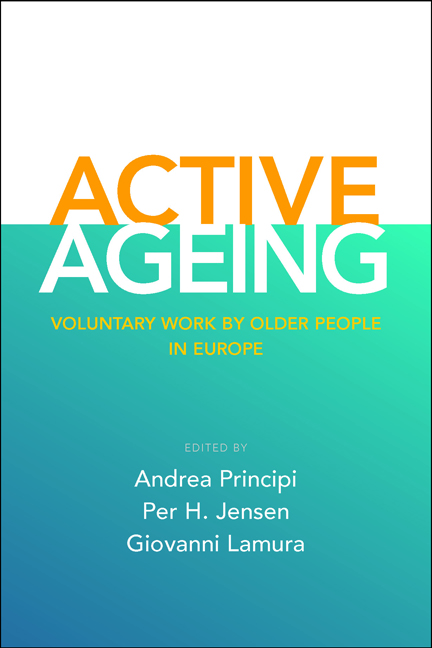Book contents
- Frontmatter
- Contents
- List of tables and figures
- Notes on the contributors
- Acknowledgements
- Foreword
- Part I Realising volunteering by older people in Europe An overarching approach
- Part II Opportunities and restrictions for older volunteers National experiences
- Part III Opportunities and restrictions for older volunteers Case studies in European voluntary organisations
- Part IV Conclusions
- Index
eight - Older volunteers in Poland: the heritage of a Socialist regime
Published online by Cambridge University Press: 05 March 2022
- Frontmatter
- Contents
- List of tables and figures
- Notes on the contributors
- Acknowledgements
- Foreword
- Part I Realising volunteering by older people in Europe An overarching approach
- Part II Opportunities and restrictions for older volunteers National experiences
- Part III Opportunities and restrictions for older volunteers Case studies in European voluntary organisations
- Part IV Conclusions
- Index
Summary
Introduction
After 1989, Poland transitioned from a centrally planned economy (controlled and monitored by the state) to an economy with a substantial share of the private sector, before eventually becoming a member of the European Union (EU) in 2004. In line with other post-Socialist welfare states, Poland aimed its welfare regime system in the direction of a liberal-residual regime type, even though a clear type of welfare regime had not been fully developed (Ferge, 2001). As with other post-transitional European states, Poland is characterised by a mix of various social insurances, social assistance and privatisation and, more importantly, has experienced stronger economic development over the last few years, which has led to a higher level of social well-being than in the former countries of the USSR (Fenger, 2007).
Before the collapse of the Socialist regime in Poland, the dominant family model was the dual earner/female double burden model, characterised by high female employment and women taking full responsibility for house and care duties. This dual breadwinner household is still quite common today. New forms of households have since emerged, such as cohabitation and single young households or single parents (Slany, 2002). During the last two decades, Poland has grappled with the challenges of inflation, privatisation, unemployment and major system reforms. An ageing population and low activity rates among the older generations have presented minor problems for policy makers. Until recently, the pension system and extensive early retirement options, along with an eligible retirement age for women at 60 and for men at 65, have favoured early exit from the labour market. As a result, the employment rates for older generations are among the lowest in Europe. The same applies to participation by seniors in voluntary activity. And the fact that this generation grew up and for most of their lives lived under a Socialist system is not to be overlooked.
The 1990s were a time of rebuilding civil society in Poland, both in the social self-consciousness and in the system regulations. Non-governmental organisations (NGOs) offered support in areas where governmental policy and public institutions were ineffective. Since the 2000s it has been a time of professionalisation and stabilisation of the third sector. Nevertheless, the participation rates of Poles in voluntary activity are well below the European average.
- Type
- Chapter
- Information
- Active AgeingVoluntary Work by Older People in Europe, pp. 173 - 196Publisher: Bristol University PressPrint publication year: 2014



